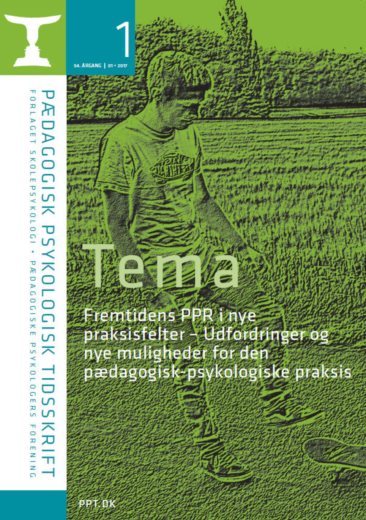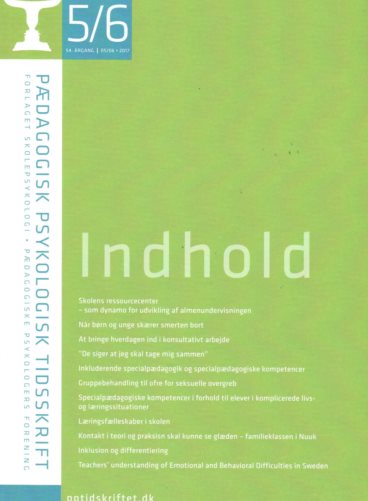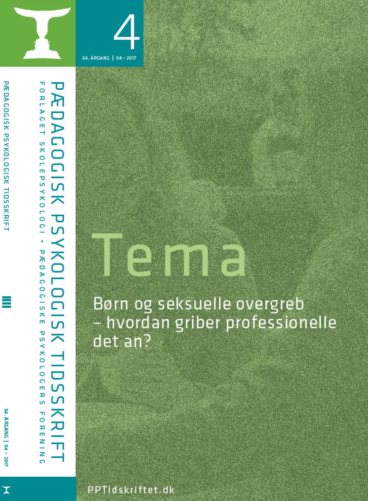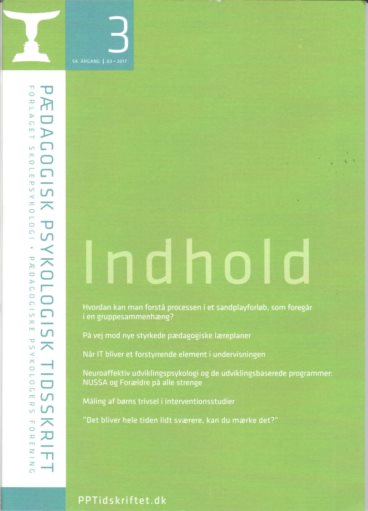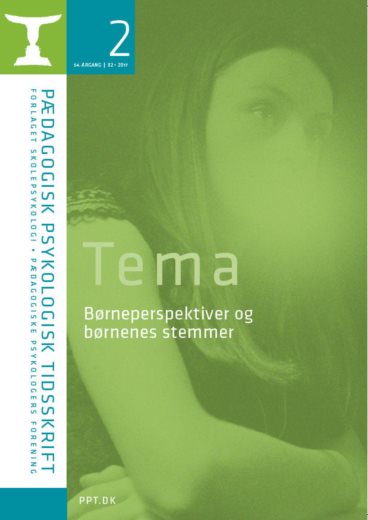Beskrivelse
Abstracts ppt 1/2017 Tema: Fremtidens PPR i nye praksisfelter – Udfordringer og nye muligheder for den pædagogisk-psykologiske praksis:
Benedicte Schilling, cand. psych. aut., Schilling CTS Ltd, Norwich, United Kingdom: Positioning: A Pedagogical and Psychological Strategy for the Psychologist Seeking Beneficial Interventions in the Future PPR. Pædagogisk Psykologisk Tidsskrift, 2017, Vol 54, 1, 5-17. The recent Danish school reform demands a very different school structure in order to bring about the development of more inclusive schools . This requires new and forward thinking of the PPR’s function as an organi- zation . It also invites rethinking the way in which the PPR Psychologists strategical- ly position themselves and contract and manage services reflecting a more service- able, collaborative and consultative approach . This article gives some suggestions as to the specific skills that the author believes the school reform and the requirements for the future PPR services requires, including an increased awareness of methods and techniques inspired by or taken from educational psychology . Inspired by edu- cational psychology and including work from Rome Harré and Michel Foucault, the article describes the concept of positioning as a range of strategic abilities that can be used to facilitate the transition of the approach and work of the PPR psychologists towards a more pedagogical and psychological inspired practice in the future . In this way, any interaction between people can be understood as an opportunity for forming etiquette and courtesy cultures, change, learning and child development . The article contains concrete, practical ideas for the future practice of PPR psychologists that focuses on contracting, the use of learning objectives, outcome focus and monitoring techniques .
Sara Bork, Louise Einspor, Lone Hygum og Vibe Strøier: “New Times, New Op portunities”: Action Learning and Knowledge Acquisition in the Specialist Module in Educational Psychology. For specialists in Educational Psycho logy. Pædagogisk Psykologisk Tidsskrift, 2017, Vol 54, 1, 18-28. This article de- scribes the program for partial fulfillment of the academic requirements for obtain- ing qualifications for the specialization in pedagogical psychology . This article de- scribes the considerations behind the creation of the program . The program consists of three parts, each of 50 hours . The program consists of lectures from different dis- ciplines . These 50 hours are followed by action learning projects carried out in the participants’ own work arena . We have aimed at reaching a profession-identity of considering pedagogical psychologists as specialists in being generalists . This arti- cle also reflects organizational targets concerning the pedagogical psychological po- sition . Hopefully this first step into mastering a specialization in pedagogical psy- chology will inspire other psychologists in PPR to also aim for a specialization .
Jacob Stenholt-Jacobsen, tidligere leder af PPR Solrød: Innovations in PPR: The Devil is in the Detail – the Beauty of Taking Small Steps. Pædagogisk Psykolo- gisk Tidsskrift, 2017, Vol 54, 1, 29-39. It is the small new initiatives and actions in everyday work in PPR, which make the main difference . It is not the grand organized innovations that provide a sustainable organization . It is the practical changes, initi- ated by the leader, but designed and created together with the employees, as well as the collaborators, which ensures that the changes are more than just fine initiatives in an annual plan .Jørn Nielsen, cand.pæd.psych., ph.d. og klinisk psykolog: PPR Responding to Children and Young People in Vulnerable Positions. Pædagogisk Psykologisk Tidsskrift, 2017, Vol 54, 1, 40-51. The most serious cases call for the highest atten- tion on changes and possible development . In order to obtain that you must take in account the quality and content in the significant contexts . Through a case, the article argues that development occurs if you focus beyond educational strategies such as placement, compensation and regulation . The child’s symptoms should be understood as expressions of core phenomena that need to be taken care of . Hence, educational psychology services need a scientific reorientation and a broader focus on intervention including family arenas .
Anne-Marie Keis, indskolingskonsulent, Cand.pæd. pæd. psyk, PPR Lolland.Vibeke Fold, ledende psykolog, PPR Lolland: A New Practice Field in PPR Lolland.
Pædagogisk Psykologisk Tidsskrift, 2017, Vol 54, 1, 52-60. Out of a desire to help solve articulated transition problems for vulnerable children in the transition be- tween day care and school, PPR Lolland created a “School Starting” consulting posi- tion, with a bridging function between day care and school .
The School Starting consultant becomes acquainted with the coming school starters in day care, six months before they start in the pre-SFO, April 1 . The School Starting consultant makes observations of the pedagogical practice in relation to the group of children and in relation to individual vulnerable children in day care, and thereby gains knowledge of what works pedagogically for the group and the individual vul- nerable child . The School Starting consultant then shares this knowledge in a series of meetings between day care and school . These meetings create a space where the two learning contexts (day care and school) become more transparent to each other . The School Starting consultant then provides guidance and supervision to the school about how to organize appropriate learning and children´s communities that benefit both the group, as well as the individual vulnerable child . It is possible for the school to draw on the school starting consultant’s expertise and knowledge throughout the whole school start process, giving the school staff the ability to fol- low up and further develop didactics and pedagogy, in relation to individual vulner- able children, as well as the entire children’s group .
Katrine Tranum Thomsen, Psykolog i PPR, Børn og Unge Aarhus og Stine Clasen, Udviklingskonsulent i PPR, Børn og Unge Aarhus: Pedagogical Training Groups and “Nest” Classes Two Examples of New Practices in Today’s PPR. Pædagogisk Psykologisk Tidsskrift, 2017, Vol 54, 1, 61-73. The article deals with PPR as being knowledge-based and knowledge-producing focusing on ensuring that it is not just about knowledge of what, but also very much on knowledge of how . The article states that the transfer and implementation of improved educatio- nal practice that works, requires conscious exercise, which is being developed, im- plemented and evaluated in true co-creation with schools and day care . The article consequently describes two concrete examples of new practices in PPR Aarhus, both being vigorous and a venture in relation to the development of new sustainable practices .
Ane Lemche, cand.psych. og Tine Lydolph, netværkskonsulent og familieterapeut: Networking in PPR. Pædagogisk Psykologisk Tidsskrift, 2017, Vol 54, 1, 74-86. Efforts to help children in vulnerable positions often focuses on the changes re- quired by the family and educators in order to improve child well-being, increased learning abilities and social and mental development . In this article, however, our focus is on the changes required by the professional network, as well as on family and school intervention . Flexibility and changes in the professional network con- sisting of social workers, mental health workers, school executives, etc ., is just as important as changes required in the classroom and in the families .
We also highlight some of the possibilities that may exist in reorganizing and rethinking the way we engage in meetings with and about children and families in vulnerable positions .
Our aim is to describe and develop an approach that enables hope, reflection and urgency to nourish the work we do with families and the way we engage them and ourselves in that work .
Henning Strand som var ledende psykolog i PPR, Herlev Kommune, da han skrev artiklen. Nu privatpraktiserende psykolog: Futureoriented Practices in the PPR. Pædagogisk Psykologisk Tidsskrift, 2017, Vol 54, 1, 87-95. In the light of three different levels of change, the article describes how leaders and employees succeed in creating progress in a public service organization in order to fulfil the ex- pectations and demands from interested parties . Furthermore, the author gives several concrete examples of how the organization continuously may put methods into practice in ways that accommodate the organization to the demands of tomor- row .
